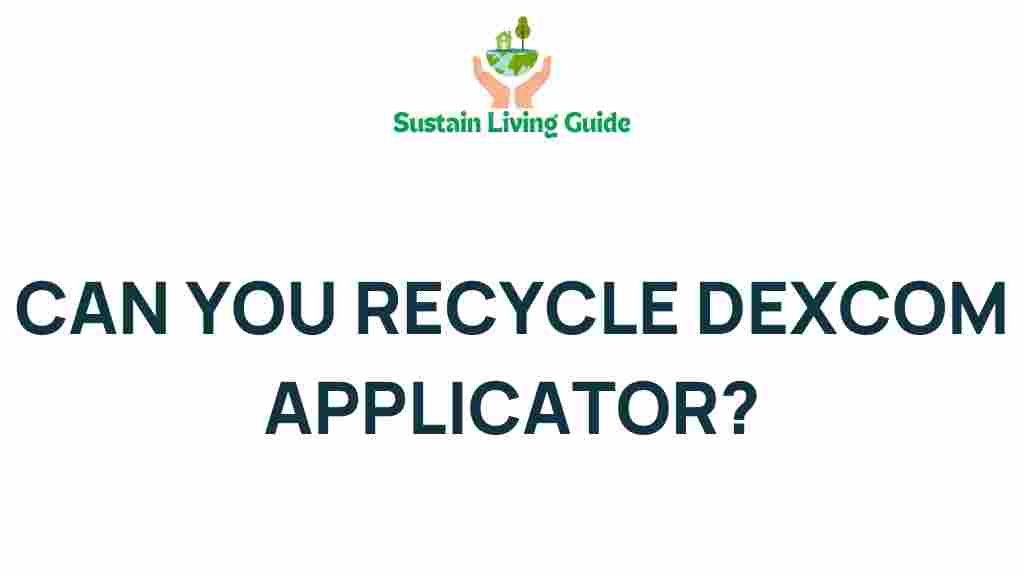Can You Really Recycle Dexcom Applicators?
In today’s environmentally-conscious world, the topic of recycling has gained significant traction, especially among those who rely on medical devices like the Dexcom continuous glucose monitor (CGM). With the rise in usage of Dexcom systems, many users are left wondering: Can you really recycle Dexcom applicators? This article aims to uncover the surprising truth about recycling Dexcom applicators, providing you with essential information to make informed decisions while considering environmental impact.
Understanding Dexcom and Its Applicators
Before delving into the recycling aspect, it’s essential to understand what Dexcom is and how its applicators work. The Dexcom system is a revolutionary tool for managing diabetes, allowing users to monitor glucose levels in real-time without the need for frequent finger pricks. Each Dexcom sensor comes with an applicator designed for easy and sterile placement on the skin.
- Dexcom G6: The latest model, offering enhanced features and a more user-friendly design.
- Dexcom G5: An older version, still widely used but gradually being phased out.
Each applicator is made of plastic and contains a needle that inserts the sensor into the skin. After use, these applicators often end up in landfills, contributing to environmental waste. This raises the question: Is there a more sustainable option?
The Recycling Process: Can You Recycle Dexcom Applicators?
The answer to whether you can recycle Dexcom applicators is not straightforward. Here’s a step-by-step breakdown of the recycling process and what you should consider:
Step 1: Understand Local Regulations
Before attempting to recycle any medical device, it’s crucial to check your local regulations regarding medical waste disposal. Many regions have specific guidelines for disposing of sharps and medical materials:
- Contact your local waste management authority.
- Check if your area offers special recycling programs for medical waste.
Step 2: Explore Manufacturer Options
Some manufacturers, including Dexcom, are beginning to implement recycling programs for their products. Check the Dexcom website or contact customer service to inquire about any existing programs for returning used applicators.
Step 3: Consider Safe Disposal Methods
If recycling isn’t an option, safe disposal is paramount. Here are some methods to consider:
- Sharps Container: Always dispose of used applicators in a designated sharps container. This ensures safety for anyone handling waste.
- Household Trash: If a sharps container isn’t available, wrap the applicator in sturdy materials and place it in your household trash, ensuring it is securely sealed.
Environmental Impact of Dexcom Applicators
The environmental impact of medical devices is a critical issue. Dexcom applicators, primarily made of plastic, contribute to the growing problem of plastic waste. According to studies, plastic waste can take hundreds of years to decompose, meaning that every applicator improperly disposed of can have lasting effects on our planet.
Alternatives to Traditional Applicators
As the demand for eco-friendly solutions grows, some companies are exploring alternatives to traditional plastic applicators. Here are a few options to consider:
- Biodegradable Materials: Research is ongoing into materials that can decompose more quickly than traditional plastics.
- Reusable Applicators: Some companies are developing devices that allow for multiple uses, reducing waste significantly.
Troubleshooting Recycling Issues
Even with the best intentions, you may encounter challenges when attempting to recycle or dispose of Dexcom applicators. Here are some common issues and their solutions:
Problem 1: Lack of Recycling Options
If you find that recycling options are limited in your area, consider advocating for more sustainable practices:
- Contact local health organizations to discuss waste management improvements.
- Participate in community clean-up events to raise awareness about medical waste disposal.
Problem 2: Confusion Over Disposal Methods
Many people are unsure about how to dispose of medical waste correctly. Here are some tips to clarify:
- Always follow local regulations regarding sharps disposal.
- Educate friends and family about the importance of proper disposal.
Conclusion: Making Informed Choices for Sustainability
In conclusion, while the recycling of Dexcom applicators may not be straightforward, it is crucial to stay informed about local regulations and manufacturer programs. The Dexcom system provides invaluable support for diabetes management, and with a focus on sustainability, users can help minimize their environmental impact.
As technology and practices evolve, there may be more opportunities in the future for recycling and sustainable disposal of medical devices. For now, staying educated about disposal methods and advocating for better options can pave the way for a greener future.
For more information on diabetes management and sustainable practices, visit Diabetes.org or check out Dexcom’s official site for updates on their recycling initiatives here.
This article is in the category Eco-friendly and created by SustainLivingGuide Team

1 thought on “Can You Really Recycle Dexcom Applicators? The Surprising Truth”